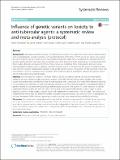Files in this item
Influence of genetic variants on toxicity to anti-tubercular agents : a systematic review and meta-analysis (protocol)
Item metadata
| dc.contributor.author | Richardson, Marty | |
| dc.contributor.author | Kirkham, Jamie | |
| dc.contributor.author | Dwan, Kerry | |
| dc.contributor.author | Sloan, Derek | |
| dc.contributor.author | Davies, Geraint | |
| dc.contributor.author | Jorgensen, Andrea | |
| dc.date.accessioned | 2017-07-13T11:30:15Z | |
| dc.date.available | 2017-07-13T11:30:15Z | |
| dc.date.issued | 2017-07-13 | |
| dc.identifier | 250512562 | |
| dc.identifier | 4a515770-29e9-4ff7-af7c-08a8b62b9c16 | |
| dc.identifier | 85023184592 | |
| dc.identifier | 000453154500142 | |
| dc.identifier.citation | Richardson , M , Kirkham , J , Dwan , K , Sloan , D , Davies , G & Jorgensen , A 2017 , ' Influence of genetic variants on toxicity to anti-tubercular agents : a systematic review and meta-analysis (protocol) ' , Systematic Reviews , vol. 6 , 142 . https://doi.org/10.1186/s13643-017-0533-4 | en |
| dc.identifier.issn | 2046-4053 | |
| dc.identifier.other | RIS: Richardson2017 | |
| dc.identifier.uri | https://hdl.handle.net/10023/11197 | |
| dc.description | MR is supported partly by Liverpool Reviews and Implementation Group (LRiG), based on funding from the National Institute for Health Research Health Technology Assessment Programme (project number 11/139/01; URL, http://www.nets.nihr.ac.uk/programmes/hta) and partly by the Effective Health Care Research Consortium, which is funded by UKAid from the UK Government Department for International Development (grant number PO 5242; URL, https://www.gov.uk/government/organisations/department-for-international-development). | en |
| dc.description.abstract | Background: Tuberculosis patients receiving anti-tuberculosis treatment may experience serious adverse drug reactions, such as hepatotoxicity. Genetic risk factors, such as polymorphisms of the NAT2, CYP2E1 and GSTM1 genes, may increase the risk of experiencing such toxicity events. Many pharmacogenetic studies have investigated the association between genetic variants and anti-tuberculosis drug-related toxicity events, and several meta-analyses have synthesised data from these studies, although conclusions from these meta-analyses are conflicting. Many meta-analyses also have serious methodological limitations, such as applying restrictive inclusion criteria, or not assessing the quality of included studies. Most also only consider hepatotoxicity outcomes and specific genetic variants. The purpose of this systematic review and meta-analysis is to give a comprehensive evaluation of the evidence base for associations between any genetic variant and anti-tuberculosis drug-related toxicity. Methods: We will search for studies in MEDLINE, EMBASE, BIOSIS and Web of Science. We will also hand search reference lists from relevant studies and contact experts in the field. We will include cohort studies, case–control studies and randomised controlled trials that recruited patients with tuberculosis who were either already established on anti-tuberculosis treatment or were commencing treatment and who were genotyped to investigate the effect of genetic variants on any anti-tuberculosis drug-related toxicity outcome. One author will screen abstracts to identify potentially relevant studies and will then obtain the full text for each potentially relevant study in order to assess eligibility. At each of these stages, a second author will independently screen/assess 10% of studies. Two authors will independently extract data and assess the quality of studies using a pre-piloted data extraction form. If appropriate, we will pool estimates of effect for each genotype on each outcome using meta-analyses stratified by ethnicity. Discussion: Our review and meta-analysis will update and add to the existing research in this field. By not restricting the scope of the review to a specific drug, genetic variant, or toxicity outcome, we hope to synthesise data for associations between genetic variants and anti-tuberculosis drug-related toxicity outcomes that have previously not been summarised in systematic reviews, and consequently, add to the knowledge base of the pharmacogenetics of anti-tuberculosis drugs. | |
| dc.format.extent | 10 | |
| dc.format.extent | 469017 | |
| dc.language.iso | eng | |
| dc.relation.ispartof | Systematic Reviews | en |
| dc.subject | Tuberculosis | en |
| dc.subject | Pharmacogenetics | en |
| dc.subject | Toxicity | en |
| dc.subject | Meta-analysis | en |
| dc.subject | RA0421 Public health. Hygiene. Preventive Medicine | en |
| dc.subject | QH426 Genetics | en |
| dc.subject | T-NDAS | en |
| dc.subject | SDG 3 - Good Health and Well-being | en |
| dc.subject.lcc | RA0421 | en |
| dc.subject.lcc | QH426 | en |
| dc.title | Influence of genetic variants on toxicity to anti-tubercular agents : a systematic review and meta-analysis (protocol) | en |
| dc.type | Journal item | en |
| dc.contributor.institution | University of St Andrews. School of Medicine | en |
| dc.contributor.institution | University of St Andrews. Infection and Global Health Division | en |
| dc.identifier.doi | 10.1186/s13643-017-0533-4 | |
| dc.description.status | Peer reviewed | en |
This item appears in the following Collection(s)
Items in the St Andrews Research Repository are protected by copyright, with all rights reserved, unless otherwise indicated.

